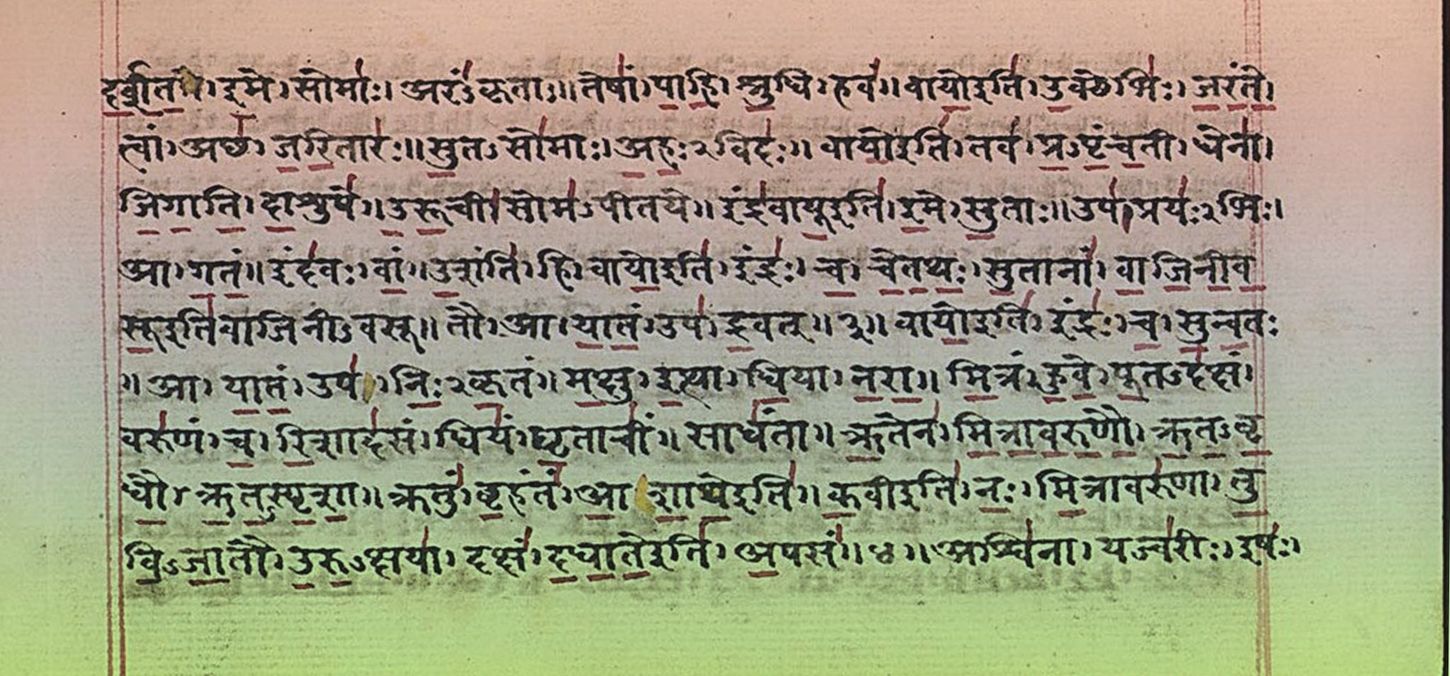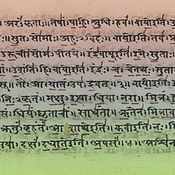
Lerne mit Dr. Ronald Steiner diesen Abschnitt genauer kennen.
Er erläutert den Sinn sowie den Text und Du kannst ihn mit ihm im Triṣṭub / Jagatī Metrum rezitieren. Abschließend hast Du die Gelegenheit, den Sinnabschnitt in einer kleinen Meditation auf Dich wirken zu lassen. Hier geht es zum Video >>
Den einen Radkranz 3, dreifach 4, sechzehnendig 5
Mit fünfzig Speichen 6, zwanzig Gegenspeichen 7,
Sechs Achtheiten 8, die eine Schnur des Weltalls 9,
Dreipfadig 10, zweibedingten 11, einen Wahnes 12,
Paul Deussen - 1897
| 3: | Das Bild von dem einen Radkranze (oder auch der einen Radnabe) mit den vielen Speichen (Kaush.3,8. Brh.3,5,15. Chând.7,15,1. Mund. 2,2,6. Prashna 2,6. 6,6) wird hier, mit Anlehnung an Sânkhyavorstellungen, näher ausgeführt. |
| 4: | Aus den drei Guna's (Sattvam, Rajas, Tamas) bestehend. |
| 5: | Auslaufend in Manas, fünf Erkenntnissinne, fünf Tatsinne, fünf Elemente. |
| 6: | Die fünfzig Affekte (bhâva) der Sânkhyaphilosophie (Sânkhya-K. 46). |
| 7: | Die zehn Sinne und ihre Objekte. |
| 8: | 1) Fünf Elemente, Manas, Ahankâra, Buddhi, 2) acht Bestandteile des Leibes, 3) acht Vollkommenheiten, 4) acht Grundaffekte (Sânkhya-K. 44-45), 5) acht Götter,6) acht Tugenden. |
| 9: | Vgl. das sûtram Brh.3,7. |
| 10: | Pitryâna, Devayâna, Erlösung. |
| 11: | Durch gute und böse Werke. |
| 12: | Der Wahn des Ichbewußtseins. |
3We meditate on him who (like a wheel) has one felly with three tires, sixteen ends, fifty spokes, with twenty counter-spokes, and six sets of eight; whose one rope is manifold, who proceeds on three different roads, and whose illusion arises from two causes.
Max Müller - 1879
| 3: | It is difficult to say whether this verse was written as a summing up of certain technicalities recognised in systems of philosophy existing at the time, or whether it is a mere play of fancy. I prefer the former view, and subjoin the explanation given by Saṅkara, though it is quite possible that on certain points he may be mistaken. The Îsvara or deva is represented as a wheel with one felly, which would seem to be the phenomenal world. It is called trivrit, threefold, or rather having three tires, three bands or hoops to bind the felly, these tires being intended for the three gunas of the prakriti, the Sattva, Ragas, and Tamas. In the Brahmopanishad (Bibl. Ind. p. 233 p. 251) the trivrit sûtram is mentioned. Next follows shodasântam, ending in the sixteen. These sixteen are differently explained. They may be meant for the five elements and the eleven indriyas or organs (the five receptive and the five active senses, together with manas, the common sensory); or for the sixteen kalâs, mentioned in the Prasñopanishad, VI, 1, p. 283. Then follows a new interpretation. The one felly may be meant for the chaos, the undeveloped state of things, and the sixteen would then be the two products in a general form, the Virâg and the Sûtrâtman, while the remaining fourteen would be the individual products, the bhuvanas or worlds beginning with Bhûh. Next follows satârdhâram, having fifty spokes. These fifty spokes are supposed to produce the motion of the mundane wheel, and are explained by Saṅkara as follows: |
Den Fünfstrom 13, der fünfquellig 14 schwillt, sich windet,
Mit fünf Hauchwellen 15, mit der fünf Sinne Urwurzel 16,
Mit Strudeln fünf 17, fünf Schmerz-Sturm wogen 18, fünfzig
Flußarmen 19 und fünf Schnellen 20, – den verstehn wir.
Paul Deussen - 1897
| 13: | Die fünf Erkenntnissinne. |
| 14: | Die fünf Elemente. |
| 15: | Die fünf Tatsinne (oder vielleicht die fünf Prânâ's). |
| 16: | Das Manas. |
| 17: | Die fünf Objekte der Sinne (Ton, Farbe usw.). |
| 18: | Aufenthalt im Mutterleib, Geburt, Alter, Krankheit, Tod. |
| 19: | Wohl wieder die fünfzig Affekte. |
| 20: | Die fünf Anfechtungen (kleshâh) des Yoga: Nichtwissen, Egoismus, Liebe, Haß, Leidenschaft. |
We meditate on the river whose water consists of the five streams, which is wild and winding with its five springs, whose waves are the five vital breaths, whose fountain head is the mind, the course of the five kinds of perceptions. It has five whirlpools, its rapids and five pains; it has fifty kinds of suffering, and five branches1.
Max Müller - 1879
| 1: | Here again, where the īśvara is likened to a stream, the minute coincidences are explained by Śaṅkara in accordance with certain systems of philosophy. The five streams are the five receptive organs, the five springs are the five elements, the five waves are the five active organs. The head is the manas, the mind, or common sensory, from which the perceptions of the five senses spring. The five whirlpools are the objects of the five senses, the five rapids are the five pains of being in the womb, being born, growing old, growingh ill, and dying. The next adjective pañcāśadbhedāṃ is not fully explained by Śaṅkara. He only mentions the five divisions of the kleśa (see Yoga-sūtras Ī, 2), but does not show how their number is raised to fifty. Dr. Roer proposes to read pañcakleśabhedāṃ, but that would not aggree with the metre. The five parvans or branches are not explained, and may refer to the five kinds of suffering (kleśa). The whole river, like the wheel in the preceding verse, is meant for the Brahman as kārya-kāraṇātmaka, in the form of cause and effect, as the phenomenal. not the absolutely real world. |
In diesem großen Brahmanrad 21, das alles
Beseelt, umschließt, – ein Schwan 22 schweift, doch nur weil er
Gesondert wähnt sich und des Rades Treiber; –
Von ihm begnadigt, wird er dann unsterblich.
Paul Deussen - 1897
| 21: | Dem Samsâra. Maitr.2,6 wird an ein Töpferrad gedacht. |
| 22: | Die individuelle Seele. |
In that vast Brahma-wheel, in which all things life and rest,
the bird flutters about, so long as he thinks that the self (in him)
is different from the mover (the god, the lord). When he
has been blessed by him, then he gains immortality. 2
Max Müller - 1879
| 2: | If he has been blessed by the Îsvara, i.e. when he has been accepted by the Lord, when he has discovered his own true self in the Lord. It must be remembered, however, that both the Îsvara, the Lord, and the purusha, the individual soul, are phenomenal only, and that the Brahma-wheel is meant for the prapañka, the manifest, but unreal world. |



 Dr. Ronald Steiner
Dr. Ronald Steiner
 Nils Jacob Liersch
Nils Jacob Liersch

Nachrichten und Bewertungen